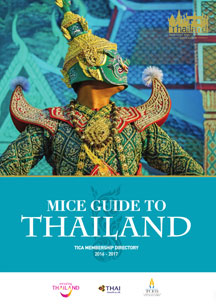
TICA MICE UPDATE
VOL: 41 SEPTEMBER-OCTOBER 2016

MICE TRENDS
“DOING BUSINESS 2017” : THAILAND RANKS THIRD IN ASEAN AND WORLD’S 46TH
Thailand was ranked the world's 46th best destination for ease of doing business, and third in Asean countries, according to "Doing Business 2017",
the World Bank’s flagship publication.
The survey by World Bank’s publication was conducted from a total of 190 countries worldwide.
Four economies in the East Asia and Pacific region rank among the top 10 economies globally in the Doing Business rankings. The top-ranked
economies are New Zealand (at 1), followed by Singapore (2), Hong Kong SAR, China (4) and the Republic of Korea (5).
In the Asean group, Singapore tops the ranking, followed by Malaysia and Thailand.
Notably, two economies from the region, Brunei Darussalam and Indonesia, are among this year’s top 10 improvers in the world.

Indonesia, which implemented seven reforms during the past year, made starting a business easier by, among other things, abolishing the minimum
capital requirement for small and medium-sized enterprises and by encouraging the use of an online system to reserve company names.
As a result, it now takes 22 days to start a business in Jakarta, compared with 46.5 days previously.
The World Bank’s flagship publication indicated this year that Thailand has apparently improved in terms of starting businesses from 96th to 78th,
on acquiring credit from 97th to 82nd, on minority investor protection from 36th to 27th and on solving insolvency from 49th to 23rd.
“Thailand is steadily making progress to ease the process of doing business,” said Ulrich Zachau, World Bank Country Director for Thailand. “Continuing
focus on reforms to promote a better business environment, in addition to implementing public infrastructure investments, developing skilled-workers
through quality education, and promoting innovations, can further improve the country’s competitiveness, which will lead to more and better jobs for many
Thai people.”

- Doing Business 2017: Equal Opportunity for All finds that entrepreneurs in 137 economies saw improvements in their local regulatory framework last year. Between June 2015 and June 2016, the report, which measures 190 economies worldwide, documented 283 business reforms.
- Reforms reducing the complexity and cost of regulatory processes in the area of starting a business were the most common in 2015/16, as in the previous year.
- The next most common reforms were in the areas of paying taxes, getting credit and trading across borders.
- Together, these 10 top improvers implemented 48 regulatory reforms making it easier to do business.

Challenges remain particularly significant in the areas of Starting a Business, Trading Across Borders and Enforcing Contracts. For example, it takes on average
57 hours to comply with border regulations for exports in the region, this is significantly longer than the average time of 12 hours it takes in OECD high-income
economies.
This year, for the first time, Doing Business includes a gender dimension in three of the 10 topics covered: Starting a Business, Registering Property and
Enforcing Contracts.
The report finds that, in those areas, few East Asia and Pacific economies have gender barriers. The exceptions include Malaysia and Brunei Darussalam,
where extra procedures are required for married women to start a business.
In addition, the Paying Taxes indicator has been expanded to cover post-filing processes, such as tax audits and VAT refund. Many East Asia and Pacific
economies perform well in these areas. There are exceptions however.
Tax audit compliance time, for example, is high in Thailand and Timor-Leste, and compliance with a VAT refund process is time-consuming in Tonga as well as Fiji.



